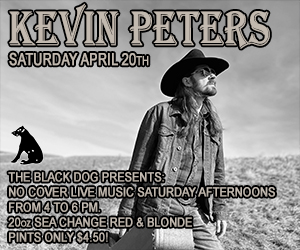THEATRE REVIEW: Dog soils the fine line between surreal and nonsense
Edward’s father is a disgraced war hero who one day started shooting his own troops because he could no longer tell the difference between them and the enemy. Edward’s wife Vally was five years old when her mother hanged herself in the kitchen.
 One thing is clear: Despite their Happy Days veneer, the characters in Dog – playing through March 27 at Theatre Network’s Roxy Theatre – are pretty messed up. Edward (playwright Jon Lachlan Stewart) has a research and development gig at the pharmaceutical company Hoffman Roche; Vally (Sarah Sharkey) is the happy home-maker, pregnant with their first child. Or maybe it’s their second try after a miscarriage. Edward tries to fix his depressed wife by feeding her experimental psychotropic drugs. One day, Edward finds a stray dog (Vincent Forcier) and brings it home. Or maybe the dog is actually their child. It’s hard to know.
One thing is clear: Despite their Happy Days veneer, the characters in Dog – playing through March 27 at Theatre Network’s Roxy Theatre – are pretty messed up. Edward (playwright Jon Lachlan Stewart) has a research and development gig at the pharmaceutical company Hoffman Roche; Vally (Sarah Sharkey) is the happy home-maker, pregnant with their first child. Or maybe it’s their second try after a miscarriage. Edward tries to fix his depressed wife by feeding her experimental psychotropic drugs. One day, Edward finds a stray dog (Vincent Forcier) and brings it home. Or maybe the dog is actually their child. It’s hard to know.
Surreal SoReal Theatre, the new Edmonton company that produced this Bradley Moss-directed world premiere, has a mission statement in the program where the word “surreal” is bandied about. I love surrealism. Few people enjoy a Luis Bunuel film as much as I do. But, at least The Discreet Charm of the Bourgeoisie had a story line you could follow.
The hard work that went into this production is evident. However – as in most cases – it’s the nebulous script that screws the pooch. Dog starts off with the characters lip-syncing their recorded lines. Sometimes they speak their lines in unison with the recording, and sometimes they don’t even move their lips to the soundtrack at all, much like Syd Barrett did during Pink Floyd’s debut on American Bandstand. For what effect this is done I have no clue, but this little stunt is what earned Pink Floyd a lifetime ban on American Bandstand.
The play is presented in a style one can only describe as “Stage Noir.” The lead characters are in white face with gray smudges. Colours are sparsely used. There is no clear reason why this was done. Most of the decisions played out on stage are baffling. This is not the necessity of surrealism: As Billy Wilder once said, “Life doesn’t have to make sense, but scripts do.”
Praise (good Dog!) can be handed out to Cory Sincennes’ set and Paul Bezaire’s video imagery projected upon it. It’s a completely symbiotic relationship that works to counterpoint the other marriage on stage that didn’t work. And I howled at Vally’s line to Edward: “Shh! I’m talking to the dog”. But for each time I wanted to pet this puppy, I found a reason to roll up my program and swat it on its snout, or at least put a flea and tick collar on it.
Oh, yes: There’s an industrial espionage subplot in the second half that wasn’t all that well set up, but at least it wasn’t hard to follow.
At one point, a co-worker says to Edward, “Enjoy your experiments.” I’d like to extend the same wish to playwright Jon Lachlan Stewart: Risk is a bitch, but failing is how new dogs learn old tricks.













